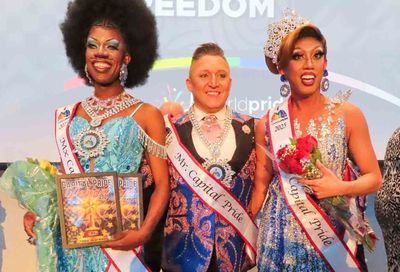Biden’s New School Rules Protect LGBTQ Students
New Title IX rules from the Biden administration protect LGBTQ students from discrimination, but sidestep transgender athlete eligibility.

On April 19, the Biden administration issued new rules outlining schools’ obligations under Title IX, the federal law prohibiting sex-based discrimination — including explicit protections for LGBTQ students.
The new rules, which take effect August 1, expand Title IX’s protections against sex-based discrimination in educational programs that receive federal funding by prohibiting discrimination and harassment based on sexual orientation and gender identity in federally-funded educational programs.
That explicit expansion of the law seeks to align Title IX guidance with the principles undergirding a landmark 2020 Supreme Court decision finding that the Civil Rights Act protects LGBTQ workers from workplace discrimination, and that instances of anti-LGBTQ discrimination are inherently a form of sex-based discrimination.
The revised Title IX rules also restore some protections for students who make sexual assault allegations against other students, offering them alternatives to Trump-era policies that required live hearings in which students could cross-examine each other when an accusation was contested.
Democrats, including some LGBTQ advocates, had long criticized the Trump-era policies, arguing they were overly deferential to students accused of sexual violence.
The new rules also expand the types of harassment complaints that schools are required to investigate, asserting that schools must address any unwelcome sex-based conduct that is so “severe or pervasive” that it limits a student’s equal access to an education, but do not completely roll back provisions instituted under former Education Secretary Betsy DeVos intended to bolster accused students’ due process rights.
“These regulations make it crystal clear that everyone can access schools that are safe, welcoming and that respect their rights,” Secretary of Education Miguel Cardona said in a call with reporters on Thursday.
Regarding the explicit LGBTQ protections, Caronda added, “No one should face bullying or discrimination just because of who they are, who they love. Sadly, this happens all too often.”
While the new rules explicitly ensure that Title IX’s protections against discrimination or harassment will apply to cases involving alleged anti-LGBTQ animus — including attempts to bar transgender students from accessing gender-affirming bathrooms and locker rooms — the Biden administration sidestepped the issue of whether transgender students should be able to play on sports teams that align with their gender identity.
The new rules find that exclusion from activities based on gender identity causes harm but do not extend to single-sex living facilities or sports teams.
The U.S. Department of Education previously proposed a separate rule to clarify that categorical bans on transgender athletes in sports violate Title IX, while still allowing schools and districts to restrict high school and collegiate transgender athletes on a case-by-case basis.
That proposed rule would have provided schools with guidance on developing athlete eligibility criteria for single-sex sports teams, while still allowing schools the flexibility to craft their own distinct policies.
Currently, at least 25 states have laws or policies prohibiting athletes who are assigned male at birth from competing on female-designated sports teams. Last year, the U.S. House of Representatives passed a bill to impose a federal ban prohibiting all transgender females from competing in women’s sports.
LGBTQ advocates praised the department for expanding the protections that LGBTQ students are entitled to under Title IX.
“We applaud the Biden administration’s action to rescind the legally unsound, cruel, and dangerous sexual harassment and assault rule of the previous administration,” Sasha Buchert, a senior attorney and director of the Non-Binary and Transgender Rights Project for Lambda Legal, said in a statement, referring to policies promulgated during DeVos’s tenure as Education Secretary.
Melanie-Willingham-Jaggers, executive director of the LGBTQ educational advocacy group GLSEN, stressed the importance of the Title IX protections.
“No child should feel unsafe in school, and the potential of the next generation is eroded when schools do not root out identity-based harassment and discriminatory policies,” Willingham-Jaggers said in a statement. “We must reject the discriminatory policies — many in violation of Title IX — that too many states have rushed to pass in an unseemly race to bully and target marginalized students.”
“Every student deserves to feel safe both on and off campus, free from the threat of discrimination or harassment,” U.S. Rep. Mark Pocan, the chair of the Congressional Equality Caucus, said in a statement. “This rule codifies critical nondiscrimination protections for LGBTQI+ students and expands protections for survivors of sexual violence, regardless of their identity. I urge the Administration to build upon this rule’s commitment to nondiscrimination by quickly finalizing regulations that clarify schools’ obligations to allow transgender students to participate in athletics.”
Support Metro Weekly’s Journalism
These are challenging times for news organizations. And yet it’s crucial we stay active and provide vital resources and information to both our local readers and the world. So won’t you please take a moment and consider supporting Metro Weekly with a membership? For as little as $5 a month, you can help ensure Metro Weekly magazine and MetroWeekly.com remain free, viable resources as we provide the best, most diverse, culturally-resonant LGBTQ coverage in both the D.C. region and around the world. Memberships come with exclusive perks and discounts, your own personal digital delivery of each week’s magazine (and an archive), access to our Member's Lounge when it launches this fall, and exclusive members-only items like Metro Weekly Membership Mugs and Tote Bags! Check out all our membership levels here and please join us today!






















You must be logged in to post a comment.